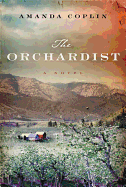
It's said that no good deed goes unpunished, and Amanda Coplin exploits the dramatic possibilities of this maxim in her debut novel, The Orchardist. Her do-gooder is William Talmadge, the titular orchardist, who has lived alone on a vast homestead in Wenatchee Valley in Washington State ever since his teenage sister disappeared during a herb-foraging walk in 1865. Talmadge has preserved the wild forested area where her bonnet was found as a sort of tribute and devoted himself to the meticulous husbandry of 25 acres of apricot, plum and apple trees. His social interactions are modest: the transitory company of horse wranglers who barter orchard work for camping rights and a chaste friendship with the midwife who lives on the edge of town.
Talmadge's inciting good deed is to refuse to let a righteous townie pursue two nearly feral girls who dash off with skirtsful of apples on market day. A few days later, the runaways, who are sisters--both pregnant--track their benefactor back to his orchard, where Talmadge, impelled to continue helping them, sows the seeds for his ensuing punishment. (A tender reward is grafted onto the bargain.)
With its frontier setting, fierce female characters and abiding themes of loss and revenge, The Orchardist recalls Charles Portis's True Grit and John Steinbeck's East of Eden. Coplin, the granddaughter of an orchardist, offers gorgeous evocations of the Wenatchee Valley's seasons and rituals. This is an extraordinarily ambitious and authoritative debut. --Holloway McCandless, blogger at Litagogo: A Guide to Free Literary Podcasts

